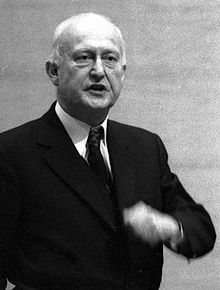Pierre Pflimlin
| Pierre Pflimlin | |
|---|---|

Pierre Pflimlin in 1975
|
|
| 97th Prime Minister of France | |
|
In office 14 May 1958 – 1 June 1958 |
|
| President | René Coty |
| Preceded by | Félix Gaillard |
| Succeeded by | Charles de Gaulle |
| 14th President of the European Parliament | |
|
In office 1984–1987 |
|
| Preceded by | Piet Dankert |
| Succeeded by | Charles Henry Plumb |
| Personal details | |
| Born |
Pierre Eugène Jean Pflimlin 5 February 1907 Roubaix, Nord-Pas-de-Calais, France |
| Died | 27 June 2000 (aged 93) Strasbourg, Alsace, France |
| Political party |
Popular Republican Movement (1944-1966) Democratic Centre (1966-1976) Centre of Social Democrats (1976-1995) |
| Other political affiliations |
Union for French Democracy (1978-1995) |
| Religion | Roman Catholic |
Pierre Eugène Jean Pflimlin (French pronunciation: [pjɛʁ flimlɛ̃];5 February 1907 – 27 June 2000) was a French Christian democratic politician who served as the Prime Minister of the Fourth Republic for a few weeks in 1958, before being replaced by Charles de Gaulle during the crisis of that year.
Pflimlin was born in Roubaix in the Nord department.
A lawyer and a member of the Christian democratic Popular Republican Movement (MRP), he was elected deputy of département Bas Rhin in 1945. With his personal roots in Alsace, Pflimlin numbered among his MRP party colleagues the Luxembourg-born Robert Schuman; for both, relations with Germany played an important role in their political thinking.
He held some governmental offices during the Fourth Republic, notably as Minister of Agriculture (1947–1949 and 1950–1951) and as Minister of Economy and Finance (1955–1956 and 1957–1958).
On 13 May 1958, the French National Assembly approved his nomination as Prime Minister. But the same day, riots took place in Algiers. The French generals in Algeria feared he would arrange for a negotiated solution with the Algerian nationalists giving them control of Algeria. They refused to recognize his cabinet. At this point the leading politicians deserted him, including Guy Mollet, Vincent Auriol, and Antoine Pinay. The crisis brought Charles de Gaulle as Prime Minister on 1 June.
...
Wikipedia
